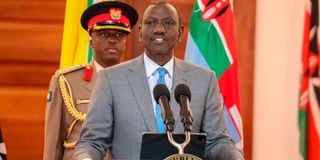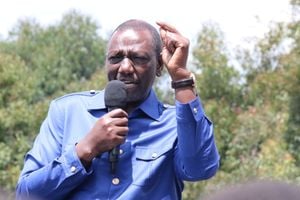
President William Ruto addresses the media from State House Nairobi on June 25, 2024.
President William Ruto is facing a tough balancing act with his back against the wall as he grapples with a new bout of pressure from the youth, amid growing discontent with his nascent administration.
With the demonstrations not showing signs of easing off, the President is facing a conundrum on how to play his cards amidst demands for sweeping reforms in the government. There’s another wave of protests planned for Thursday, July 18.
The new wave of protests demands more heads in the Kenya Kwanza government, including that of the President, as they ramp up pressure for a fresh start.
Gen Z has also rejected any calls for dialogue, or the formation of a broad-based government involving power-sharing among the political class, and has warned against returning any of the sacked Cabinet Secretaries (CSs) to the government.
President Ruto is also facing mounting pressure from the political class who have begun vouching for their interests to be factored in as part of the much-awaited reforms.
After dismissing his cabinet last week, the Head of State said he will now engage in extensive consultations across all sectors, including political formations, with the aim of setting up a broad-based government.
He added that he is also keen on making the government lean, inexpensive, effective and efficient moving forward.
Government operations
In the meantime, he added that government operations will continue under the leadership of Principal Secretaries (PSs) and other relevant officials.
But the President's plans may now run into headwinds as the youth are opposed to any government that includes the political class, complicating plans for a 'government of national unity' as Dr Ruto races against time to form a new Cabinet.
The youth also want more shake-ups in the government with an eye on the 51 PSs and parastatal heads, adding to the President's headache.
So far, only Inspector General of Police Japhet Koome has resigned, allowing the President to institute changes in the National Police Service with Douglas Kanja assuming Mr Koome’s position, albeit acting.
“The fish rots from the head and the buck stops with William Ruto. The problem in this country is not the Cabinet he sacked, not even the Parliament he controls. These two people, Ruto and Rigathi, are the problem,” said Vihiga Senator Godfrey Osostsi.
A section of Muslim clerics is pushing for the President to sack Prime Cabinet Secretary Musalia Mudavadi, and reinstate Attorney General Justin Muturi.
The Kenya Muslim National Advisory Council (Kemnac) led by chairman Sheikh Juma Ngao wants Dr Ruto to go ahead and direct the prosecution of some of the CSs accused of engaging in corruption or misappropriation of public funds.
Mr Ngao warned that any attempt to return any of the sacked ministers would not auger well with Gen Zs.
Kemnac vice chairman Abubakar Amin said a lifestyle audit of all the sacked CSs must be conducted to reveal whether there is harmony between their lifestyles and their salaries.
“An audit of their bank accounts must be conducted before and after they were appointed CSs to see whether there is anything fishy about them,” Mr Amin said.
Face serious hurdles
Talks of a lean government by the President could also face serious hurdles with different quarters pushing for their interests.
Kemnac has begun lobbying to have the next Cabinet have at least five Muslims, up from two in the dissolved one.
However, the biggest pressure appears to be from the vote-rich Mt Kenya region where Deputy President Rigathi Gachagua’s close ally, Nyeri Governor Mutahi Kahiga, has warned the President to tread carefully as he prepares to name a new Cabinet.
The governor argued that since the region accounted for 47 percent of the total votes that secured the Kenya Kwanza's victory, President Ruto should ensure the new Cabinet reflects the same.
He said the region had eight seats in the dissolved Cabinet and that the region would not take anything less since the seats were part of a pre-election agreement.
“I accept that we cannot force decisions on Ruto; however, all our eight seats should remain intact. This is a warning that if Ruto wants to assign other people from other regions to his Cabinet, he should consider the other 14 vacant positions but leave the eight for Mt Kenya,” said Mr Kahiga.
“If he decides to touch any of the eight seats, then we will reconsider a few things. Ruto should remember that he did not give us these seats; we fought for them,” he added.
With the relationship between the President and his deputy strained, the UDA party leader is facing a litmus test on how he will navigate the dicey issue of a new Cabinet with eyes on his re-election bid.
Containing his deputy while also wooing the opposition into his fold is another headache that Dr Ruto must confront.
DP Gachagua has reminded his boss that he should form a new Cabinet made up of only individuals keen on putting the interest of Kenyans before theirs.
According to the second in command, such people should neither be arrogant nor engage in politics, but whose sole focus will be helping him deliver to the people of Kenya.
“Look for cabinet secretaries who will help you run the government. Ministers who are not arrogant and boastful, ministers who will not engage in politics,” said the DP.
There is also a split within the opposition on whether to close ranks with the President and have a working relationship.
Already, Azimio coalition affiliates, including Wiper, Jubilee and DAP-Kenya, have opposed any plans for dialogue, and even within Raila Odinga-led ODM, the call is threatening to split the party.
But even appearing to have the ODM leader on board has not helped matters for the President as the youth have pressed on with their protests with three people losing their lives on Tuesday in the latest protests.
The Gen Zs are also planning to continue with the demonstrations with their next move being to occupy Uhuru Park on Thursday.
Mr Odinga has also been blowing hot and cold on the matter, following backlash from the youth on talks of such talks.
President Ruto had announced a six-day multi-sectoral forum dialogue starting this week, bringing together 150 participants with 50 of them being youths while 100 of them coming from the religious community, civil society, political parties and professional groups.
Nonetheless, the planned national dialogue appears to have aborted with the government mum on it after a fierce pushback from the youth.
Critical projects
Mr Musyoka said that Wiper supports Gen Z’s rejection of any dialogue, saying the government does not need dialogue to implement critical projects in the country.
“In terms of the Gen Z revolution, it appears that the administration lacks an understanding of public sentiment. Generation Z does not wish to engage in dialogue. They want action and Wiper agrees,” Mr Musyoka said.
The sentiments by the former vice president is a sharp contrast to Mr Odinga’s earlier stance where he reiterated the importance of dialogue, saying that it would give Kenyans a chance to be heard.
“Dialogue is the way forward out of the crisis we are having in our country. We have agreed that we give people an opportunity to be heard, to express themselves so that a lasting solution can be found,” said the former premier.
But while visiting Kware in Mukuru kwa Njenga slums in Nairobi on Sunday, Mr Odinga seemed to have backtracked on his support for a national dialogue, saying “they cannot dialogue with people whose hands are full of blood”.
“Those who have done these heinous acts against our people are animals. As Azimio, we cannot sit for talks with people whose hands are full of blood of innocent youth,” said Mr Odinga as he was faced with anti-government chants.
Dissolution of Parliament
The youth have also been demanding for the dissolution of Parliament, a snap election be called, and that President Ruto steps down.
But even if the latter two were to be actioned, there is another conundrum in the name of lack of an electoral agency.
The country has been operating without an Independent Electoral and Boundaries Commission (IEBC) since the expiry of terms of former chairperson Wafula Chebukati and two commissioners Boya Molu and Abdi Guliye in January 2023.
Other four commissioners, led by former vice chairperson Juliana Cherera, were kicked out after rejecting 2022 presidential election results.
More than a week ago, Dr Ruto signed into law the IEBC (Amendment) Bill, 2024, the paving way for appointing the selection panel that will recruit IEBC’s new commissioners.
Nonetheless, if all factors are held constant, the country can only have a new fully constituted electoral team in place by October 28 or November 4, 2024.








